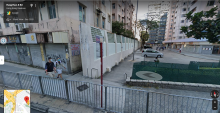08 Oct 1942, John Charter's wartime journal
Primary tabs
Stop Press - Latest bed bug news! This morning Tim and I took our beds to pieces and carted them out onto the lawn by the tool store shed. Here we unscrewed still more nuts and bolts (I don’t think Tim will ever assemble his again!) untill all cracks and joints were fairly well accessible. Tim then had to depart to work at the C.S.O. and Marjorie took over. Marjorie is swift but, I am bound to add, somewhat slap dash. She brought some hot water, soap and a scrubbing brush and scrubbed pretty vigorously round the end of their rattan straw mattress. I think she got rid of most of the eggs and the bugs that were not quick enough off the mark to dive inside the mattress before her scrubbing brush reached them. I’m afraid there is only one way of getting rid of the bugs from the mattress and that is to burn it. However the Fortescues are evidently determined not to do this until another mattress is forthcoming or until they get a couple of camp beds, and as I hear there are still people sleeping on the floor in some of the buildings, it seems unlikely that they will speedily acquire any additional sleeping material. So I fear this looks like another bone of contention in our room!
It is hard luck on the Fortescues, for it means they have to choose between sleeping on a bed bug infested mattress or the wire springs of their bed. I should prefer the wire, which is the old fashioned type of fine wire mesh stretched over a frame: but to each one, his own choice I suppose. I shall be most annoyed if our bed becomes again infested from this wretched mattress!
I spent all morning scrubbing with soap and water, the rectangular wooden frame on which our wire springs are stretched. I removed scores of little white eggs and several smallish bugs. After lunch I obtained two big enamel mugs full of boiling water and poured it carefully all over the wooden frame, douching thoroughly all the cracks and pouring water between the eased joints. I think that has settled the hash of any remaining bugs and eggs as hot water quickly kills insects. Unfortunately there is no disinfectant or paraffin available in the camp. Tomorrow I will turn my attention to the supporting teak bedstead and treat it similarly. Teak is excellent wood and seldom harbours insects, so I don’t anticipate much trouble here. We shall leave the whole bed out in the wind and the sun for about three days during which time we shall have to revert to our old custom of sleeping on the floor. So much for bed bugs!
The ‘Hong Kong News’ reported that the Japanese ship Lisbon Maru, while transporting 1,800 British troops from a southern port to a destination in Japan, was torpedoed and sunk by an American submarine. Apparently the ship was near some islands or hugging the coast, for it said that some of the survivors swam ashore. A later report states that many of the prisoners and crew were rescued but that about 1,000 perished. That sort of thing is appalling to hear of, when allies of a cause unwittingly destroy one another. To make things locally worse, we heard news to the effect that 1,700 of the Canadian military prisoners in HK had embarked for transhipment to Japan, and the fear is that it was this luckless contingent that has suffered. Poor Canadians - if so - they have had a rotten deal in Hong Kong.
However, we have also heard another rumour (some weeks ago) that an advance guard of the British prisoners in Singapore were being taken to Formosa or Korea to form a labour squad with the object of building a prisoner of war camp for all British war prisoners taken by the Japanese during this war. If this is true, the men on the ill fated Lisbon Maru may quite well have been some of these British troops from Singapore (re-christened by the Japanese ‘Shonan’). The only cheerful part of it is that we know American submarines are operating along this coast and must be taking a toll of Japanese transports and supplies en route to the Solomon Islands and New Guinea which are apparently, the present scenes of operations between American, British (largely Australian) and Japanese forces.
The day following the announcement in the Japanese paper of the sinking of the Lisbon Maru, the paper made the further report that the British prisoners of war aboard the ill fated ship had all come from Hong Kong. This was a horrible piece of news for us in this camp, especially for the many wives, sisters and mothers here of HK war prisoners, for no less than 900 are reported lost (just half the number). We hear it was not the Canadian contingent and the guess is that it consisted chiefly of the regular British troops here - the Middlesex and the Royal Scots plus (probably) all British Sappers. The C.S. applied immediately for particulars and Yamashita forwarded them straight away. Up to date no details have been returned.
The Japanese are rather extraordinary in this respect. I consider that, in the main, their conduct of the war against the British has been very fair, but I criticise the harsh way in which they refuse to allow any communication whatever between prisoners of war out here and their wives in this camp. It seems odd that they should allow people here, with next of kin in England, to write to them (by Red X) and yet not allow a person like Isa to write to her husband not more than 10 miles distant in Argyl Street Camp. And it seems a long time now since the news of the Lisbon Maru.

